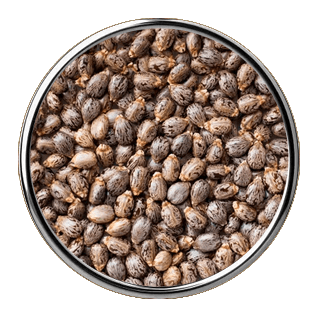Castor Seeds are the seeds of the castor oil plant, known for their high oil content and industrial importance. These seeds contain 40–55% oil, which is primarily composed of ricinoleic acid, a unique fatty acid not found in significant quantities in other oils.
Castor seeds are processed to produce castor oil, a valuable raw material used in a wide range of industries including pharmaceuticals, cosmetics, lubricants, and biofuels.

High Oil Yield : Up to 55% oil content per seed
Rich in Ricinoleic Acid : Contributes to anti-inflammatory, antimicrobial, and lubricant properties
Non-edible : Used solely for industrial and medicinal processing
Drought-Resistant Crop : Grows well in arid climates, making it a sustainable oil seed
Castor Oil Production : Used in lubricants, greases, paint, inks, resins, and plastics
Pharmaceutical Industry : Castor oil is used in laxatives, skin ointments, and drug carriers
Cosmetic Industry : Used in soaps, hair oils, lip balms, and moisturizers
Biofuels & Biopolymers : A growing source for renewable energy and green plastics
Agricultural Uses : Cake left after oil extraction is used as organic manure
| Parameters | Value |
|---|---|
| Oil Content | 40%–55% |
| Moisture | Max 8% |
| Purity | 98%–99% |
| Color | Brownish with mottled markings |
| Size | Medium to large (varies by variety) |